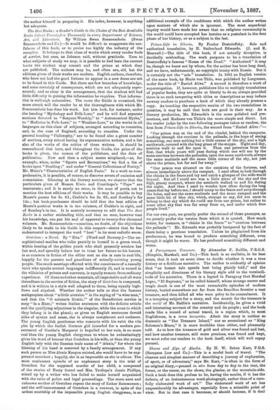Gretchen a Novel. By "Rita." (Ward and Downey.) — The no- sophisticated
maiden who talks prettily to herself in a green wood, within hearing of the golden youth who shall presently awaken her fair soul, and speedily induce her to trust her future to his honour, is as common in fiction of the sillier sort as she is rare in real life, happily for the parents and guardians of actually-existing young people. The mock-marriage effected with the connivance of a rascally valet who speaks several languages indifferently ill, and is versed in the villainies of priests and convents, is equally remote from ordinary experience. Of these and other materials, all improbable and all wore threadbare in the service of fiction, the story of Gretchen is composed, and in is written in a style well adapted to them, being equally high- flown and slipshod. Whether the anther tells no that the famous malapropism about " a little aversion " is the saying of "a wise man," and that the "O salataris Hestia!" of the Benediction service is sung "in a Mass ;" writes Italian sentences with the definite article and the qualifying adjectives in the singular, while the noun to which they belong is in the plural; or gives us English sentences devoid alike of syntax and sense, she is always complacent and cocksure. The young English gentleman who concocts with his valet the vile plot by which the foolish German girl intended for a modern pre- sentment of Goethe's Margaret ie beguiled to her ruin, is no more real than the young English clergyman to whom he unhesitatingly gives his ward of honour that Gretchen is his wife, or than the young English lady with the Russian male name of " Alexis," for whom the blessing of his hand is reserved by a family arrangement. If any such person as Miss Alexis Kenyon existed, she would have to be sup- pressed somehow ; happily, she is as impossible as she is odious. The most unpleasant episode of an unpleasant story is the trial of Gretchen for the supposed murder of her child, a compound of the stories of Betty Sorrel and Mrs. Trollope's Jessie Phillips, mixed up by a writer who has failed to make herself acquainted with the rules of police and legal proceedings. The stern aunt and unknown mother of Gretchen repeat the story of Esther Sammereon ; and the self-immurement of Gretchen in a convent, in spite of the ardent courtship of the impossible young English clergyman, is an
additional example of the confidence with whioh the author writes upon matters of which she is ignorant. The most superficial inquiry would have made her aware that no religions community in the world could have accepted her heroine as a postulant in the first phase of her history, or as a subject in the last.


















































 Previous page
Previous page